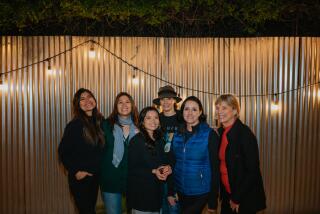Overhauling Attitudes
- Share via
Cars, grease and mechanical parts were not familiar elements in Karen Valenti’s life growing up.
And Ida Jenkins certainly had not planned on sticking her head under a hood for a living.
But both are part of an increasing number of women who, either by choice or fortune, are reshaping the image of the auto mechanic.
What distinguishes them, these mechanics said, is not only their gender, but their communication style. Translating CV joints or master cylinders into a language their customers understand marks their approach.
“Women are treated like imbeciles when they bring cars in to a mechanic, when it’s the mechanic who is the one with the problem--he doesn’t know how to communicate,” Valenti said.
This approach radically differs from previous encounters with mechanics, said female customers who go to Valenti’s shop.
“I always felt when I took my car in for repairs that they would jiggle something else so that I would have to bring it back,” said Judy Bridge, an insurance agent who works in Sherman Oaks. “I felt I was being taken, but I had to trust them, because I didn’t know what they were talking about.”
The use of jargon in car repair intimidates and frustrates customers, noted Valenti, who said 75% of her patrons are female.
“If women were brought up around cars like they were brought up around kitchens, they wouldn’t have this blind spot,” Valenti said.
So whether it’s comparing an automobile to the human body or explaining a repair like a cooking recipe, Valenti and other female mechanics said they use unconventional language to help demystify the car.
Valenti has owned and operated the North Hollywood Discount Auto Center since her third husband left her and abandoned the business in March 1991. She also teaches a class in basic auto mechanics through Women Helping Women, a program of the National Council for Jewish Women.
Bridge, who has taken her 1989 Ford Probe to Valenti’s shop for seven years, said she feels more comfortable with her car after taking the class five months ago.
“As a single woman today . . . I prefer to know what’s going on, because the only one who is going to do it is me,” Bridge said. “If someone’s going to tell me I need radiator fluid, I want to be able to check the radiator fluid myself.”
From downtown auto repair classes to car dealerships in the San Fernando Valley, women are slowly permeating a field many say still is regarded as “a man’s world.”
Moira Kenney got her doctorate in urban planning at UCLA last June. By day, she works as a researcher at the J. Paul Getty Museum in Malibu.
But on Monday and Wednesday evenings, Kenney gets trussed up in blue coveralls for the latest installment in her education--”Automotive 114: Steering, Suspension and Brakes, Principles and Practices.”
Kenney said she always wanted to take shop in high school, but her parents felt that “somehow, shop was a little over the line.” After she finished her doctorate, her sister reminded her of her interest in auto repair.
Now Kenney said she is going to follow her dream: be a writer and open a car garage.
“I didn’t know anything at first,” Kenney said. “But once I got out here and started working on the cars, it became really wonderful.”
In the large room through door 3 at Los Angeles Trade Technical, Kenney bends over the open hood of a car with her classmates--mostly men. She is one of about five women among the 225 students taking automotive classes on the campus.
Although Kenney said she felt her male classmates tested her at first, her eagerness to learn soon earned their respect.
“Once you show that you’re willing to get dirty, to get greasy and not worry about it . . . they’re really supportive,” Kenney said.
The number of female auto mechanics has slowly grown, with 5,000 joining the ranks in the last decade, according to the Census Bureau, although women still make up only about 1% of car mechanics nationwide.
The increased emphasis on technical skills over physical strength may have brought more women into the business, said Denise McClugage, a senior contributing editor at Auto Week magazine, who also writes a syndicated column about cars. “You don’t need strength to lift the engines out anymore.”
Although car repair still is dominated by men, McClugage said it is no surprise that women want to get involved.
“I think it’s true that traditionally in our culture, women are the caregivers,” McClugage said. “What’s the difference between caring for a person or caring for a car? They’re both complicated mechanisms.”
Julie Godfrey, the service manager at West Valley Toyota--the second woman to hold that position in the Los Angeles area--said she and other managers are anxious to hire more women.
Women are “conscientious about overseeing things and making sure things are done perfectly,” said Godfrey, who has worked in auto repair for 15 years. “Men seem to be too technical . . . male customers even say they don’t get things explained to them in laymen’s terms.”
But, Godfrey added, many women do not realize the opportunity is out there.
Some customers agreed that the perception that auto mechanics are always men still lingers.
Linda Cumberbatch, a registered nurse who has been taking her 1985 Honda Accord sedan to Valenti for five years, said she gets one response when she talks about car repair with people: “Your mechanic is a woman?” After the initial shock, she says, some are so intrigued they ask to be referred to Valenti’s shop.
Valenti, Jenkins and Rebekah Fleischaker all own auto repair shops along a five-mile suburban stretch of Van Nuys and North Hollywood.
Although their businesses differ, all share the sentiment that few women follow a traditional route into auto repair.
Jenkins, whose Aamco Transmission franchise is down the street from Valenti’s shop, took it over when her husband died in 1986.
“I had no plans of going in the transmission business,” Jenkins said, “but I had a great need to work. Being black and a woman, it was very vital to me that my daughters go through college.”
Fleischaker learned car repair after working for a mechanic in Florida 11 years ago.
When she came to Los Angeles, she helped an acquaintance replace a master cylinder and was promptly deluged with calls from people asking for her help.
Now she runs California Automotive, and says women make up about 60% of her business.
Fleischaker teaches free seminars occasionally to “keep people from getting ripped off.”
Knowing about your car will give you much more leverage, Fleischaker said. “It’s almost like you have this little sign on you that says, ‘I don’t know anything, so go ahead and charge me what ever you want.’ ”
For Kenney, the best part about learning auto repair is clear: “I got up one Sunday morning and said, ‘I’m going to change the oil in my car!’ ”
Kenney has already volunteered to fix a friend’s brakes before he left on a cross-country trip.
“It’s great,” she said. “It’s something not a lot of people have.”
Her parents are surprised that she keeps going to the classes, Kenney added. “They have a notion that it was a passing fancy. They can’t believe not only that I’m still doing it, but that I’m more excited about it every time I go.”






